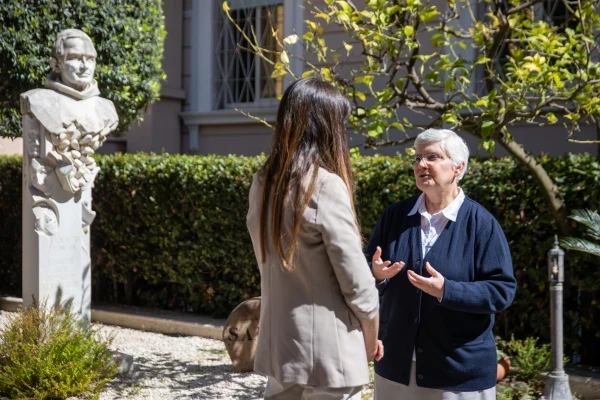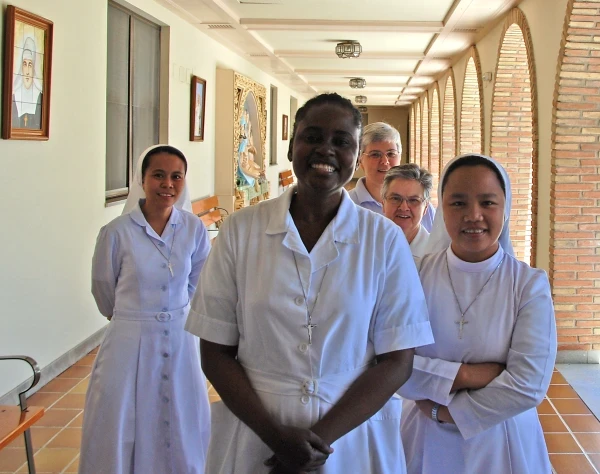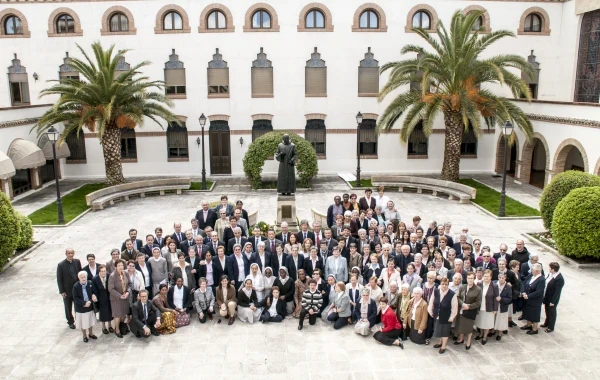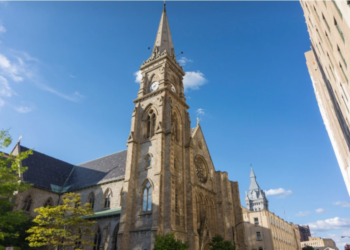Vatican City, Apr 8, 2025 /
08:00 am
For Sister Idília María Moreira G. Carneiro, superior general of the Hospitaller Sisters, illness is not just a diagnosis or a curse to be avoided at all costs but a privileged place to encounter God.
“For us, the sick are like the theological place where God speaks to us and where we also speak about God and to God,” she explained in an interview with ACI Prensa, CNA’s Spanish-language news partner.
“We are a congregation whose heart and soul is mercy,” she added.
Since its founding in 1881 in Spain, this congregation has been a refuge of tenderness for the world’s outcasts, especially those suffering from mental illness.
With a presence in more than 25 countries, the nuns serve nearly 400,000 people each year, and their mission is nourished by the certainty that Christ is on the other side of pain.
“When the meaning of life seems to fade, only God can imprint that light of hope,” Sister Idília assured.
There is no superficial idealization of illness in her words, only a total and unconditional surrender to the pain of others until it becomes one’s own.

“In the sick, we discover the living presence of Christ, who challenges us and also confirms us in our fidelity,” said Sister Idília, who was born in Mozambique in 1966 and whose petite figure and simple demeanor contrast with the immense strength of her heart.
“The life I’ve chosen shapes the service I perform. My vocation is a gift I discover in my relationship with Jesus, in sharing with the community, and, above all, in serving the sick, especially people with mental illness, who are the preferential recipients of our mission,” she said.
On one occasion, she had as a patient a terminally ill man who was not a believer. He was in a palliative care unit, and when she entered his room, he asked her to leave him alone with the crucifix.
“And he said, ‘I think I need to have a very important conversation with him,’” she recounted, observing that faced with the certainty of his imminent death, this man felt he had to reconcile himself with God.
This experience and many others have confirmed to her that faith “also influences the process of therapeutic rehabilitation and recovery.”
Through their service, the Hospitaller Sisters, unassuming heroines, remind the world that every life, even in its fragility, has absolute value.
The worldwide health crisis brought on by COVID-19 placed illness at the center of daily life, and the Hospitaller Sisters had to triple their efforts.
“Faced with a life-threatening situation, it came to the fore that the most important thing is humanity, care, proximity, and closeness,” she emphasized.
(Story continues below)
Subscribe to our daily newsletter
Sister Idília noted that the pandemic also brought to light deep wounds in society that are now being felt in the form of “psychic fragility,” “anxiety,” “accelerated family crises,” and depression, especially among young people and adolescents.
“We are less tolerant … Society as a whole is much more individualistic, and we are more closed in on ourselves,” she commented.
She then noted that the fraternity that Pope Francis calls for and their mission to the sick is countercultural in a narcissistic world where people are more and more self-centered.
“Everyone lives thinking only about themselves, and this is a great challenge for the Church and for humanity itself,” she noted.

‘The sick teach us a lot’
“Accompanying them, getting to know so many lives touched by suffering, who don’t lose that meaning and that human sensitivity; on the contrary, illness makes a person closer, more sensitive, and even more attentive to the needs of others. The sick also teach us a lot, because they are much more attentive to the human dimension,” she commented.
“In illness there is life, there are dreams, there are projects, there is meaning, there is potential, and that challenges us,” she said in the lead-up to this past weekend’s Jubilee of the Sick, the seventh major event of the Jubilee Year of Hope, which her congregation welcomed with joy to revitalize its mission.
“Our mission is a mission of hope because we believe in the intrinsic dignity of every person, beyond their illness,” she said with conviction. For the congregation, the jubilee is a call to reaffirm its commitment to the sick and their families.
“We are organizing various initiatives at the local level and actively participating in diocesan events. Some of our centers have been designated as jubilee churches, because we believe that places for healing and welcome are in themselves doors of hope,” she explained.
A family marked by caring for the sick
Love for the most vulnerable is not an isolated trait in Sister Idília’s life but a core element that runs through her family history. Three of her sisters have dedicated themselves to the same hospitaller vocation, a fact that speaks to the deep roots of faith that their parents instilled in them.
“Our parents left us a legacy in which faith and charity for the poorest complement each other and are seen as essential in life, and that becomes a part of our makeup,” she reflected.

This living out of Gospel values, through helping the poorest, “has helped us create within us that fertile soil where the vocation to consecrated life also grows and awakens.”
In fact, in May 2024, she succeeded her sibling, Sister Anabela Carneiro, as superior of the congregation.
This story was first published by ACI Prensa, CNA’s Spanish-language news partner. It has been translated and adapted by CNA.


















